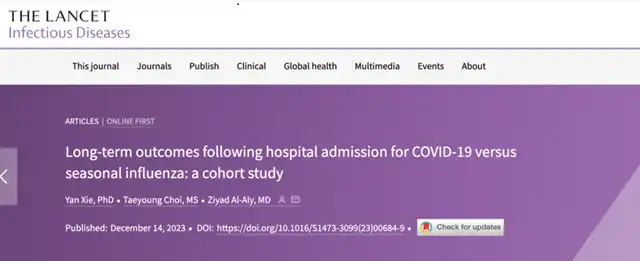Lingering Effects of Seasonal Influenza: A Cause for Concern
- Normal Liver Cells Found to Promote Cancer Metastasis to the Liver
- Nearly 80% Complete Remission: Breakthrough in ADC Anti-Tumor Treatment
- Vaccination Against Common Diseases May Prevent Dementia!
- New Alzheimer’s Disease (AD) Diagnosis and Staging Criteria
- Breakthrough in Alzheimer’s Disease: New Nasal Spray Halts Cognitive Decline by Targeting Toxic Protein
- Can the Tap Water at the Paris Olympics be Drunk Directly?
Lingering Effects of Seasonal Influenza: A Cause for Concern
- Should China be held legally responsible for the US’s $18 trillion COVID losses?
- CT Radiation Exposure Linked to Blood Cancer in Children and Adolescents
- FDA has mandated a top-level black box warning for all marketed CAR-T therapies
- Can people with high blood pressure eat peanuts?
- What is the difference between dopamine and dobutamine?
- How long can the patient live after heart stent surgery?
Lingering Effects of Seasonal Influenza: A Cause for Concern
Follow-up Study of 90,000 Individuals Over 18 Months Reveals Increased Risks and Concentration of Aftereffects in the Lungs.
This winter is not proving to be any better than the last one, as hospitals are witnessing a surge in influenza cases, contrasting with the prevalence of COVID-19 patients last year. The impact of both infections is noteworthy, as even after recovering from COVID-19, some individuals are still grappling with lingering olfactory issues.
A recent 18-month follow-up study involving 90,000 individuals suggests a correlation between seasonal influenza and increased risks of six different aftereffects, primarily concentrated in the lungs. The findings, published in The Lancet Infectious Diseases, prompt a closer examination of whether the flu, like COVID-19, can exert long-term adverse effects on our health.

Researchers, led by Ziyad Al-Aly from Washington University in St. Louis, analyzed data from the U.S. Department of Veterans Affairs. The study compared 81,280 individuals hospitalized for COVID-19 between March 1, 2020, and June 30, 2022, with 10,985 individuals hospitalized for influenza between October 2015 and February 2019. Notably, 76.1% of influenza cases were influenza A, with the remaining cases attributed to other types. The average age was 70.73 years, and females comprised 5% of the participants.
During the follow-up period, the study found that the cumulative mortality rate for COVID-19 patients was 28.46 per 100 individuals, whereas for seasonal influenza patients, it was 19.84 per 100 individuals. This indicates a higher risk of death among COVID-19 patients (HR=1.51).
Similarly, the risk of readmission and admission to the intensive care unit (ICU) was higher for COVID-19 patients compared to influenza patients. The cumulative incidence rates showed that, for every 100 individuals, COVID-19 patients had 20 more readmissions and 9 more ICU admissions than seasonal influenza patients.
The study also assessed the risk of aftereffects during the follow-up period. COVID-19 patients were associated with an increased risk of 64 out of 94 (68.1%) aftereffects, spanning 10 organ systems, including cardiovascular, coagulation and blood, respiratory, fatigue, gastrointestinal, musculoskeletal, and neurological systems, among others.
In contrast, seasonal influenza patients were linked to an increased risk of 6 out of 94 (6.4%) aftereffects, primarily related to heart-related issues, diabetes, and respiratory problems. Risk analysis by organ system revealed that, except for respiratory issues, COVID-19 patients had a higher risk of developing aftereffects in other systems compared to seasonal influenza patients.
Crucially, the study emphasized that, aside from gastrointestinal issues, over half of the disease burden for both COVID-19 and influenza patients occurred beyond the acute infection period (30 days), highlighting the importance of post-acute care for those hospitalized with these infections.
In conclusion, Al-Aly’s team’s research underscores that both seasonal influenza and COVID-19 can have lasting impacts on our bodies, emphasizing the need to focus on the long-term healthcare requirements of individuals affected by these infections.
Lingering Effects of Seasonal Influenza: A Cause for Concern
Reference:
Long-term outcomes following hospital admission for COVID-19 versus seasonal influenza: a cohort study[J]. The Lancet Infectious Diseases, 2023.
(source:internet, reference only)
Disclaimer of medicaltrend.org
Important Note: The information provided is for informational purposes only and should not be considered as medical advice.



